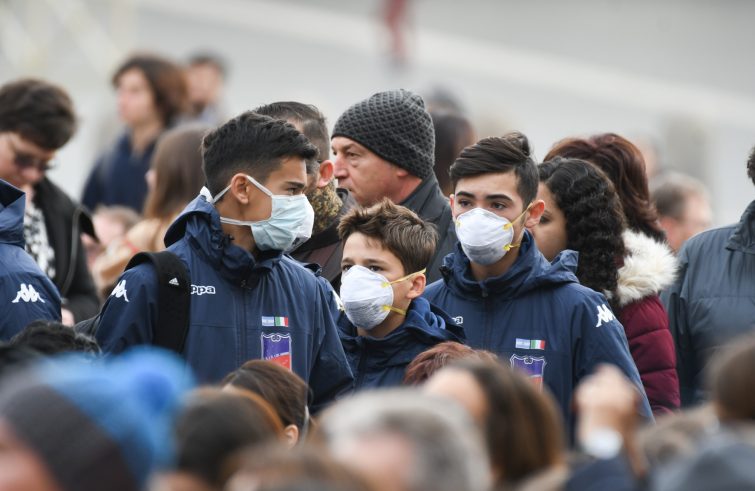
They feel stressed out and discouraged, and are less confident about the future. The pandemic has had an “enormous” impact on their social life, it “negatively” affected their school performance (exams and entrance tests), it cut them out “completely” from internships, vocational training and employment. For this reason, an overwhelming majority (83%) demand that university courses be reopened with regular on-campus presence. When asked how they might handle the prospect of a third confinement, 53% replied: “I would not be able to endure it psychologically.” On a brighter note, almost all respondents (94%) said that faith was “a source of support during the pandemic.” These were the findings of a consultation commissioned by the French Bishops’ Conference involving young Catholic students aged 17 to 25. From 29 January to 7 February, 2,639 students, 63% of them women, with a mean age of 21, answered the online questionnaire posted on social media networks linked to the Bishops’ Conference. The results of the survey, presented yesterday afternoon at a press conference in Paris, show that for 71% of French Catholic students the sacrifices made for the “common good” during the pandemic were “excessive and unjustified.” With regard to the impact that the health crisis has had on the “morale” of young people, 68% replied that their social life had been “enormously” affected; for 50% the crisis has made it harder to have “a healthy and balanced life”; for 41% the situation had a negative impact on their school results, exams and entrance tests, while 50% said it had hampered job placement “dramatically.” 31% of respondents felt “discouraged”, 20% “sad” and 36% “stressed out”. When asked about how they felt about the future, 27% said they had “no confidence whatsoever.” As concerns the support networks that helped them during the lockdown period, 85% said it was their “friends” and 84% their family. Alongside their French peers, who took to the streets, a large majority (83%) of young Catholics demanded the reopening of all university courses. Students were asked about the role played by the faith during the pandemic, and it emerged from the survey that, in addition to friends and family, students found support in the Christian groups they belong to (23%) and parishes (11%).
https://twitter.com/Eglisecatho/status/1362399062369181702
 “Today, as Church, we cannot ignore these situations of discouragement and distress. We offer our contribution to creating a more fraternal and human society”, said Msgr. Laurent Percerou, bishop of Nantes, President of the Bishops’ Council for the Pastoral Care of Young People, commenting on the findings of the consultation to journalists. ” We are thus called to give practical answers that will ensure that these youths do not feel that their generation has been sacrificed at the altar of COVID-19. They are the life of the world and the hope of the Church, and especially the students who are preparing to become the future protagonists in the life of society. Bishop Percerou went on to outline a number of “avenues” for action, ranging from support to “social stores” (épiceries sociales) created to help and accompany young people and families in difficulty, to the commitment, starting with universities, involving outreach efforts to the most lonely students in this time of forced confinement. For example, the Nantes diocese initiated a project whereby small groups of young people enter university dormitories, knock on the doors of the rooms and ask if students need anything, in which case they offer moral support or, more simply, friendship. Similar initiatives are also being set up in Lyon and Nice. The crisis caused by the pandemic also affected businesses and companies in their capacity to offer jobs, internships and training. The Church of France has therefore consulted the Association of Christian Entrepreneurs and Managers to determine if something can be done in this area.
“Today, as Church, we cannot ignore these situations of discouragement and distress. We offer our contribution to creating a more fraternal and human society”, said Msgr. Laurent Percerou, bishop of Nantes, President of the Bishops’ Council for the Pastoral Care of Young People, commenting on the findings of the consultation to journalists. ” We are thus called to give practical answers that will ensure that these youths do not feel that their generation has been sacrificed at the altar of COVID-19. They are the life of the world and the hope of the Church, and especially the students who are preparing to become the future protagonists in the life of society. Bishop Percerou went on to outline a number of “avenues” for action, ranging from support to “social stores” (épiceries sociales) created to help and accompany young people and families in difficulty, to the commitment, starting with universities, involving outreach efforts to the most lonely students in this time of forced confinement. For example, the Nantes diocese initiated a project whereby small groups of young people enter university dormitories, knock on the doors of the rooms and ask if students need anything, in which case they offer moral support or, more simply, friendship. Similar initiatives are also being set up in Lyon and Nice. The crisis caused by the pandemic also affected businesses and companies in their capacity to offer jobs, internships and training. The Church of France has therefore consulted the Association of Christian Entrepreneurs and Managers to determine if something can be done in this area.
In-person university learning must resume as soon as possible. The French bishops join in the request of college students. The universities in France were reopened in October and then closed soon after. President Emmanuel Macron addressed the issue in the aftermath of a student protest in France, announcing measures against the precarious situation of young people and that students should be allowed on campus once a week “We would strongly support this request,” said Bishop Percerou, who also called for the reopening of university canteens (resto’U) to enable students to benefit from the €1 meal.
“Universities are places where young people prepare for a professional career, leading up to the working environment, where youths are nourished by culture, whether through plays, concerts or cultural encounters.
In this time of pandemic, students have been stripped of all this. We all have, but it is they who have suffered the most, at their age they need to establish social ties and open up to the future.










